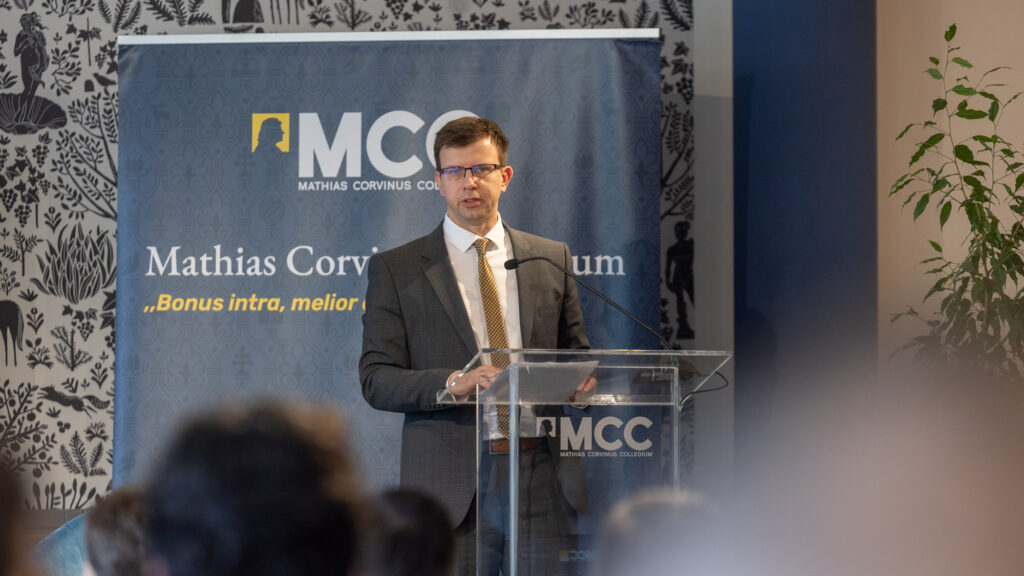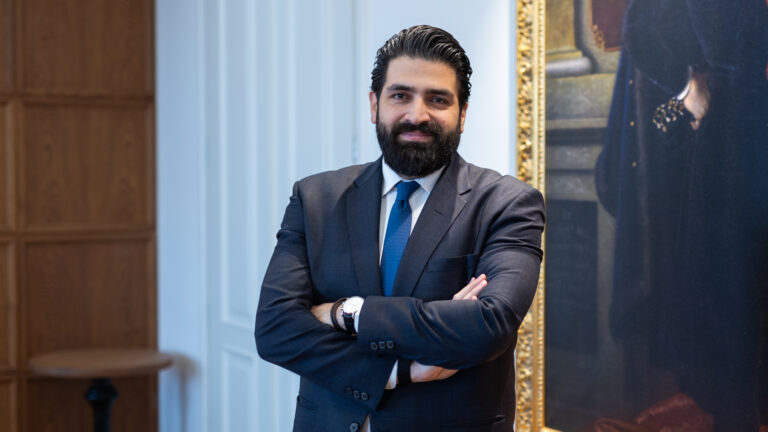Martin Zsarnóczky is President of the American–Hungarian Chamber of Commerce of New York (AmHunCham). He holds a degree in economics, with a focus on the intersection of economic development, quality of life, and well-being. He is also an external member of the Hungarian Academy of Sciences. On 17 April he visited the Danube Institute to sign a Memorandum of Understanding between the prominent Hungarian conservative think tank and the American–Hungarian Chamber of Commerce of New York. During his visit, he sat down with Hungarian Conservative to discuss US–Hungarian economic and trade relations, while also addressing the seismic changes currently reshaping the world order as we know it.
***
Although our interview will cover many important topics, the principal reason for our conversation is the Memorandum of Understanding between the American–Hungarian Chamber of Commerce in New York and the Danube Institute. What is the purpose of this cooperation?
Primarily, I believe that two distinguished organizations, both deeply committed to Atlantic affairs, have joined forces through this collaboration. Our primary objective is to facilitate access to the American market, and our secondary aim is to support American investments in Hungary and, more broadly, Central and Eastern Europe. The Danube Institute is an outstanding partner, as it stands firmly in favour of Atlantic commitment, as does the American–Hungarian Chamber of Commerce of New York, which operates partly in the United States and partly in Hungary and the surrounding region. Our Chamber’s origin was established in 1909, and we are proud to uphold historical traditions and knowledge that our members can rightfully cherish. It is important to us to cooperate with partners not only within New York State but also across several other states along the East Coast, and in recent years we have also developed active relations in Texas. We place particular emphasis on integrating tradition into our communications, thereby reinforcing continuity and credibility.
Danube Institute
📄✍️ Összefogás a transzatlanti együttműködés elmélyítése érdekében 🇭🇺🔗🇺🇸 Fontos lépés Magyarország és az Egyesült Államok közötti gazdasági kapcsolatok erősítése érdekében a Danube Institute és a…
Your organization’s history spans more than a century. What areas does your activity cover, and what goals do you seek to achieve?
It is worth noting that the Chamber was founded in 1909, during the era of the Austro–Hungarian Monarchy. At that time, there was a need in New York for a chamber that primarily brought together members of Hungarian nationality, although not exclusively so. The ‘melting pot’ character of the period made it possible for a distinguished organization to emerge, capable of bridging multiple nationalities and languages. The business generations of the time typically spoke six to eight languages, enabling them to understand one another and thus facilitating joint business success. We are committed to preserving this tradition and dialogue. Accordingly, we do not focus solely on Hungary or Budapest but also extend our attention to Hungarian communities and entrepreneurs in neighbouring countries. Our principal aim is to provide advocacy for interests in the American market, meaning we assist Hungarian and European companies in exploiting business opportunities, as well as familiarizing them with the American legal and regulatory environment, which often differs considerably from European norms. Our primary target group is medium-sized enterprises, particularly multigenerational family businesses, the so-called family offices, which do not fall within the category of large corporations.
Thus, you are active both in the United States and Hungary. How does your work differ in the two countries?
It is important to emphasize that in every European Union member state there exists an AmCham organization, which offers legal and other assistance to multinational companies entering from America. However, our activities differ: large corporations are represented among us to a much lesser extent, whereas we are innovative and able to respond rapidly to challenges. In our work, we maintain relations with numerous member organizations, whether they be chambers of commerce or industrial and entrepreneurial associations. Our reach along the American East Coast encompasses approximately 100,000 to 150,000 companies. This extends beyond New York City to New York State, New Jersey, Georgia, Florida, and Texas. There is considerable interest from European companies in these states, and we are able to assist through our local presence and network of contacts. Our activities focus on mapping market opportunities, developing analyses, seeking partners, and organizing direct business meetings. Parallels can be drawn with Hungary’s HEPA export promotion system; however, in the United States, similar organizations operate at the state, county, and city levels as well. In recent years, we have actively participated in promoting the Select USA Investment Summit in Hungary, in cooperation with the Commercial Department of the United States Embassy. We organize this event annually to enable Hungarian entrepreneurs to establish direct contact with American states and to access tailor-made offers. It is important to note that in the United States, various support programmes exist which do not necessarily require the establishment of an American headquarters. Our Chamber is composed exclusively of active entrepreneurs who manage their own businesses and can thus offer real-life examples and practical experience to those contemplating foreign market expansion.
What opportunities are available today for Hungarian companies in the American market?
We observe that recent times have brought unprecedented opportunities for European, including Hungarian, companies. For the first time, a business climate can be felt that is particularly favourable towards European firms. Based on our experiences, companies with a presence not only in Hungary but also in neighbouring countries are able to achieve success in America more quickly and easily than those operating solely within Hungary. Our cooperation was established precisely to bridge this gap: by transferring cultural, business, and local knowledge, we can assist Hungarian firms in entering the American market with greater ease.

And what about the opposite direction?
The American–Hungarian Chamber of Commerce of New York is committed to organizing business delegations to Hungary and the United States on a regular basis, although not necessarily every year. A few years ago, after a hiatus of 20 years, a business delegation once again visited Hungary, accompanied by an official legislative delegation comprising senators and a businessmen’s delegation from New Jersey. Their explicit aim was to forge new business relationships. It is noteworthy that several members of the delegation had Hungarian roots, further strengthening cultural bonds and business openness. On the American side, there was a clear demand for knowledge and experience exchange, whether in the form of capital investment or know-how transfer. The most prominent sectors were IT, services, and family enterprises.
In recent years, Hungarian–US relations have become deeply politicized, which has inevitably affected commercial ties. So far, we have mainly seen the negative side, such as the Biden administration’s unilateral termination of the double taxation treaty. How has this affected the business sector?
I believe that the termination of the double taxation treaty must be viewed from two perspectives: political and economic. We are hopeful that the political situation will stabilize and that a solution will soon be found. From an economic perspective, we saw that most affected small and medium-sized businesses responded with flexibility: many resolved the issue by relocating their headquarters to Slovakia or Romania, for example. In retrospect, it can be stated that while the matter was significant, it did not cause disruption of such magnitude that it would have resulted in a long-term deterioration of economic relations. I am confident that the situation will normalize, and that political resolution will follow in the near future. This is one of the changes the Hungarian government expects from Donald Trump’s second presidency.
At the same time, many of the measures the US president introduced, often seen as radical, have initiated irreversible changes in international politics and trade. What lies ahead?
In an article published in Világgazdaság, I analyzed in detail how, over the past 30 years, members of the baby boomer generation have directed economic processes, with presidents also emerging from that generation. This provided stability but now we are on the brink of a generational transition. Changes are unfolding that are not merely economic decisions but indications of deeper structural transformations. Formerly dominant industries—such as steel and traditional automotive manufacturing—are retreating, while the service, technology, high tech, med-tech, and biotech sectors are advancing. At present, the future direction of the global economy remains unclear, but it is certain that the emerging economic models will thoroughly reshape it. A renewed business mentality is also likely to emerge.
What is already visible is the return of protectionism. What impact might the tariffs announced by Trump have, both on Europe, including Hungary, and globally?
The tariff increases primarily affect goods rather than financial or service sectors. The tariff regime is constantly evolving, making it difficult to predict precise effects; however, at present, we see no trends suggesting that this would significantly hinder companies seeking entry to the American market. Even with higher tariffs, importing from Asia—particularly from China and India—remains profitable due to extremely low production costs. Building factories within the United States does not necessarily become more attractive, as it requires an appropriate economic environment, workforce, and infrastructure and local expertize. Current tariff increases are manageable and do not represent a major obstacle for either European or Hungarian companies. It should be noted that political objectives often underlie tariff wars. Nevertheless, tariff rates of around 10–20 per cent remain manageable and are unlikely to trigger a mass relocation of manufacturing to the United States. Services, particularly IT solutions, are generally not subject to tariffs, as they operate via cloud-based systems.
Many experts argue that we are living through historic times. What is your opinion on this? How often do paradigm shifts of a magnitude comparable to the current one occur in global trade?
We are currently at the intersection of several long-term processes. From an American economic perspective, three principal sectors must be examined: finance, services, and manufacturing. The American financial services sector remains dominant, and the dollar's supremacy persists. However, the rise of the fintech sector is introducing serious competition for traditional players. In the field of services—particularly IT, management, and technological services—American companies (Alphabet, Meta, Amazon, etc) continue to lead globally.
‘Future economic development requires less state intervention and greater global entrepreneurial cooperation’
Manufacturing, however, is undergoing transformation: increasingly, production activities are being relocated to more affordable countries. From a business standpoint, it makes sense that if something can be produced more cheaply elsewhere, it should be. In my view, one of the main reasons behind the current economic turbulence is that governments worldwide have exceeded their appropriate economic roles and are seeking excessive influence over the market. There is a need for states to retreat from the business sphere and to grant greater autonomy to enterprises. Chambers of commerce and business organizations can provide significant assistance in this regard.
What can be done to counter this trend?
I believe that future economic development requires less state intervention and greater global entrepreneurial cooperation. Entrepreneurs must unite internationally around shared interests, such as in joint product development projects. No individual actor can solve these challenges alone; it is evident that the current crisis affects everyone globally. Challenges cannot be successfully addressed in isolation—only through cooperation.
All things considered, what future lies ahead for Hungarian–American relations? What obstacles must be overcome to achieve successful cooperation?
At present, there are no obstacles impeding Hungarian–American economic relations. This is very positive news. Looking to the future, it is vital that American companies view Hungary not merely as a standalone market, but as a regional hub encompassing 120 million consumers from Poland to Greece. Political leadership in Hungary is striving vigorously to establish such a role. If this central position can also be strengthened in smaller-scale industries, remarkable opportunities may arise. Every country in the region (Poland, the Czech Republic, Slovakia, Romania, Hungary) seeks to highlight its unique attributes. However, if emphasis were placed on the concept of a common market, Hungary could assume a distinguished central role within the region. Both the Danube Institute and the American–Hungarian Chamber of Commerce of New York are working to realize this vision.
Read more of our interviews:







